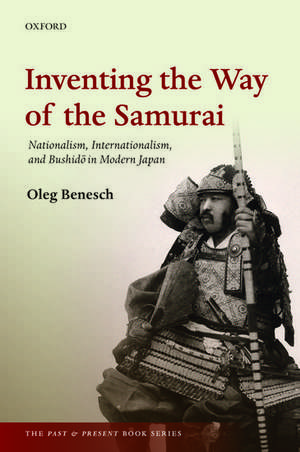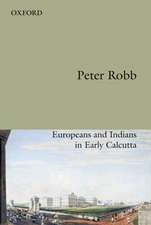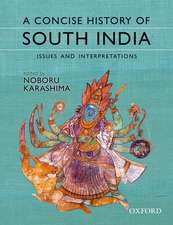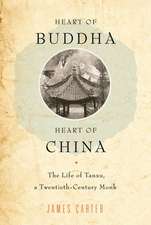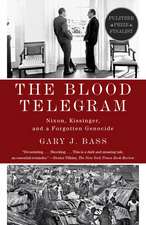Inventing the Way of the Samurai: Nationalism, Internationalism, and Bushidō in Modern Japan: The Past and Present Book Series
Autor Oleg Beneschen Limba Engleză Paperback – 28 apr 2016
| Toate formatele și edițiile | Preț | Express |
|---|---|---|
| Paperback (1) | 310.43 lei 10-16 zile | +194.74 lei 5-11 zile |
| OUP OXFORD – 28 apr 2016 | 310.43 lei 10-16 zile | +194.74 lei 5-11 zile |
| Hardback (1) | 716.85 lei 31-37 zile | |
| OUP OXFORD – 11 sep 2014 | 716.85 lei 31-37 zile |
Din seria The Past and Present Book Series
- 30%
 Preț: 601.95 lei
Preț: 601.95 lei - 18%
 Preț: 168.33 lei
Preț: 168.33 lei - 11%
 Preț: 197.62 lei
Preț: 197.62 lei - 18%
 Preț: 193.11 lei
Preț: 193.11 lei - 12%
 Preț: 193.18 lei
Preț: 193.18 lei - 14%
 Preț: 185.87 lei
Preț: 185.87 lei - 13%
 Preț: 192.68 lei
Preț: 192.68 lei - 25%
 Preț: 521.29 lei
Preț: 521.29 lei - 25%
 Preț: 522.88 lei
Preț: 522.88 lei - 11%
 Preț: 198.24 lei
Preț: 198.24 lei - 12%
 Preț: 193.07 lei
Preț: 193.07 lei - 13%
 Preț: 192.89 lei
Preț: 192.89 lei - 24%
 Preț: 474.14 lei
Preț: 474.14 lei -
 Preț: 231.46 lei
Preț: 231.46 lei - 13%
 Preț: 275.25 lei
Preț: 275.25 lei - 16%
 Preț: 268.72 lei
Preț: 268.72 lei - 26%
 Preț: 546.29 lei
Preț: 546.29 lei - 30%
 Preț: 725.10 lei
Preț: 725.10 lei - 26%
 Preț: 575.78 lei
Preț: 575.78 lei - 15%
 Preț: 558.24 lei
Preț: 558.24 lei - 11%
 Preț: 239.22 lei
Preț: 239.22 lei - 30%
 Preț: 486.62 lei
Preț: 486.62 lei
Preț: 310.43 lei
Preț vechi: 378.80 lei
-18% Nou
Puncte Express: 466
Preț estimativ în valută:
59.41€ • 61.79$ • 49.04£
59.41€ • 61.79$ • 49.04£
Carte disponibilă
Livrare economică 13-19 martie
Livrare express 08-14 martie pentru 204.73 lei
Preluare comenzi: 021 569.72.76
Specificații
ISBN-13: 9780198754251
ISBN-10: 0198754256
Pagini: 304
Dimensiuni: 156 x 235 x 16 mm
Greutate: 0.46 kg
Editura: OUP OXFORD
Colecția OUP Oxford
Seria The Past and Present Book Series
Locul publicării:Oxford, United Kingdom
ISBN-10: 0198754256
Pagini: 304
Dimensiuni: 156 x 235 x 16 mm
Greutate: 0.46 kg
Editura: OUP OXFORD
Colecția OUP Oxford
Seria The Past and Present Book Series
Locul publicării:Oxford, United Kingdom
Recenzii
In conclusion, I'd say Benesch's book is not only a classical work in Japanese history, but also one I would heartily recommend to anyone interested inthe history of Japanese philosophy.
This monograph is first rate, even if I was left wanting more. I suppose that is generally the case with fine books.
Benesch's history of bushidō as an invented tradition with an ideological character delivers on the title's promise. Students of intellectual history will appreciate the example of an idea created, branded as tradition, and then variously applied by multiple ideological positions. Modernists will benefit from Benesch's explanation of the Imperialist appropriation of bushidō as a tool for militarization of the population through World War II. And Japan specialists are finally armed with a full argument against bushidō's historicity.
Benesch provides a comprehensive overhaul of the history of the development of bushidō. He demonstrates great expertise in presenting the various texts and their roles in the discourse ... this book is a highly gripping read and provides a well-informed contribution to the historical development and powerful influence of invented traditions.
Benesch has provided us with a valuable history of modern Japan through the lens of a particularly resilient ideology. It will be of great interest to students of Japanese history, not to mention to anyone concerned with the intellectual history of invented modern traditions.
Oleg Benesch's Inventing the way of the Samurai is a seminal, scrupulously researched work that teems with ideas. Its content is profoundly relevant to current political developments in Japan, as questions about the Constitution and the nation's identity come to the fore ... an essential guide to this crucial aspect of Japan's intellectual history.
Inventing the Way of the Samurai is an excellent book.
This is a solid, well-written, and immensely informative piece of scholarship ... Benesch's chronicle of the ebbs and flows of the bushidō discourse makes for fascinating reading
This monograph is first rate, even if I was left wanting more. I suppose that is generally the case with fine books.
Benesch's history of bushidō as an invented tradition with an ideological character delivers on the title's promise. Students of intellectual history will appreciate the example of an idea created, branded as tradition, and then variously applied by multiple ideological positions. Modernists will benefit from Benesch's explanation of the Imperialist appropriation of bushidō as a tool for militarization of the population through World War II. And Japan specialists are finally armed with a full argument against bushidō's historicity.
Benesch provides a comprehensive overhaul of the history of the development of bushidō. He demonstrates great expertise in presenting the various texts and their roles in the discourse ... this book is a highly gripping read and provides a well-informed contribution to the historical development and powerful influence of invented traditions.
Benesch has provided us with a valuable history of modern Japan through the lens of a particularly resilient ideology. It will be of great interest to students of Japanese history, not to mention to anyone concerned with the intellectual history of invented modern traditions.
Oleg Benesch's Inventing the way of the Samurai is a seminal, scrupulously researched work that teems with ideas. Its content is profoundly relevant to current political developments in Japan, as questions about the Constitution and the nation's identity come to the fore ... an essential guide to this crucial aspect of Japan's intellectual history.
Inventing the Way of the Samurai is an excellent book.
This is a solid, well-written, and immensely informative piece of scholarship ... Benesch's chronicle of the ebbs and flows of the bushidō discourse makes for fascinating reading
Notă biografică
Oleg Benesch is Anniversary Research Lecturer in History, specializing in the history of early modern and modern Japan. Before arriving at the University of York, Dr Benesch was Past & Present Fellow at the Institute of Historical Research at the University of London. He has spent almost six years living and researching in Japan, including two years each at Hitotsubashi University and Reitaku University in Tokyo. Dr Benesch's publications and teaching interests cover a variety of fields, including Japanese intellectual, religious, and social history, Chinese intellectual history, as well as the transnational history of modern East Asia. He has presented his research findings at academic conferences and invited lectures throughout East Asia, Europe, North America, and Australia.
